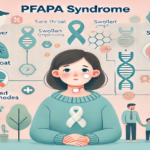Dalla newsletter di PFAPA Yahoo group e da PFAPA USA e CHILD:
PFAPA NewsletterBy Laura ‘Van Tassel’ Bray in PFAPA Child · Edit doc
February 2, 2012
Dear Parents and Families,
We are mailing you this newsletter to update you on the progress we have made in our Periodic Fever, Aphthous stomatitis, Pharyngitis, Adenitis (PFAPA) syndrome research. Please distribute this newsletter to all interested relatives, and send me updated contact information for your family because addresses and emails may have changed.
Additional families
We are now following 170 patients with recurrent fever syndromes, and 70 patients with PFAPA in our fever clinic at Rady Children’s Hospital, and continue to see new families each month. PFAPA may be more common that initially thought. While there is still no identified gene causing PFAPA, as time has passed, we have learned that more patients have relatives with a history of recurrent fevers, surgery to remove their tonsils or PFAPA itself. These patient stories suggest that there may be a genetic component to PFAPA which we are very excited to investigate.
We are always updating our confidential database in order to have an accurate estimate of the prevalence of PFAPA and the experiences of our families. Please don’t hesitate to contact us if you have learned of family members with similar symptoms since we last spoke. We appreciate the emails, calls, or regular mail concerning new relatives and new contact information, as well as updates. As always, this information will remain confidential.
Ongoing Research
We have continued to accept tonsils from PFAPA patients having their tonsils removed surgically by our collaborators in the Ear, Nose and Throat division. We are able to take apart the tonsils to look at them at a microscopic level. From these samples, we have learned that tonsils from patients with PFAPA are different from tonsils of patients with other disorders. The tonsils appear to be more activated at baseline, producing inflammatory proteins that are naturally involved in fighting infection and producing fever. We still do not understand why this occurs in the tonsils or how it may play a role in the monthly fevers and symptoms of PFAPA. We are continuing to study tonsils and blood cells from people with PFAPA to learn more about these unique tonsils.
Some researchers have questioned whether PFAPA may be related to the inherited fever disorders and have found DNA changes in known recurrent fever genes that might be associated with PFAPA. To learn if these
genes may be associated with PFAPA or influence the symptoms and course of the disease, we may contact you to obtain DNA from you and your family members.
Current Therapies
As you know, there is no specific test for PFAPA. Reviewing calendars of symptoms to identify patterns continues to be the cornerstone for diagnosis. Many children with PFAPA are able to use comfort measures such as cool compresses or medicines such as Tylenol or ibuprofen to help with their monthly fever episodes until they outgrow the syndrome. Some families wish to try other treatments to see if their fever episodes can be reduced or eliminated. The treatments currently being used and studied are described briefly here. However, the decisions of how to best treat PFAPA episodes need to be made on a case by case basis by the patient and treating physicians.
We have learned that PFAPA episodes are uniquely responsive to a one small dose of an oral steroid. Very few diseases will respond to just one low dose, and we have found that this response can help in the diagnosis. We typically recommend that every patient try the steroid dose at least once. Your physician may be able to tell you more about steroids in PFAPA.
Other medications have been used to control symptoms, including montelukast (an allergy medicine), cimetidine (a heartburn medicine), or colchicine (a medication typically used for gout or familial Mediterranean fever syndrome). For some families with recurrent fevers, daily use of these medications has led to a decrease in the number or severity of fever episodes. Unlike the steroids described above, these medicines are taken every day, whether or not there is fever. These are possible options that may be discussed with your physicians.
One of the proteins produced by PFAPA tonsils is called Interleukin (IL)-1 or IL-1, a protein that is naturally involved in fighting infection and producing fever. An injectable medication called anakinra can help reduce the effects of IL-1. Anakinra is used in other fever disorders and has been tried in some patients with PFAPA during attacks. Again, discuss with your doctor whether anakinra may be an option for your family.
The possibility of removing the tonsils as a treatment for PFAPA has also been studied. A number of our families have chosen this option and here in San Diego we have seen a 92% success rate in eliminating fever episodes in the months following surgery. The decisions of whether or not to have tonsils removed for PFAPA need to be made on a case by case basis by the patient and treating physicians.
Future plans
We will continue studying PFAPA at Rady Children’s Hospital San Diego and UCSD. Our work is currently funded by The Hartwell Foundation and the Thrasher Research Fund, which will continue for about 1.5 more years. We plan to apply for additional funding to extend our work. We will continue to update you as to our progress.
Thank you again for your support of our research efforts. Please feel free to contact us if you have questions.
Sincerely,
Lori Broderick, M.D., Ph.D. Hal Hoffman, M.D.
lbroderick@ucsd.edu hahoffman@ucsd.edu
 Mamme e PFAPA
Mamme e PFAPA




Lascia un commento